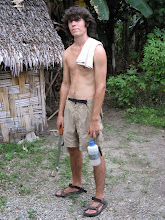There apparently is some huge weather phenomena plaguing the Southwest, as all flights going through Dallas the day we were trying to leave were cancelled. Apparently, this had been going on for several days prior. As far as I could tell, it was just raining a lot, but I guess that's why I don't pilot commercial aircraft.
Anyway, we re booked our flight for the following day through Raleigh, NC instead of Dallas and got off without a hitch. Unfortunately, this new itinerary left us with a 7-hour layover in London Gatwick. We arrived in Gatwick, de-planed and had to change terminals for our connection. This involved touring an all-but-deserted part of the airport and going through what was perhaps the slowest security checkpoint I'd ever seen. The 7+ people working it seemed to be utterly incapable of operating on any timescale faster than geologic. Fortunately, there were only 3 of us in line. Exiting security, however, we were dumped into a waiting area that resembled a refugee camp. The place was swarming with exhausted-looking people (I don't know were they all came from, as the security point we went through would have taken years to process them all) sprawled out all over the combination shopping mall-terminal. Most seemed like they needed a shower and were desperately trying to sleep on whatever surface was available. Some looked like they had long ago give up getting on a plane.
We made it through the wait and the short plane ride to Portugal and arrived in the city of Porto. The city's airport was enormous, despite the fact that it only seemed to be hosting one or two planes. In fact, most of Porto, including the metro stops, streets, and most buildings, seemed to be significantly larger than was required by the population that used them. This gave the city the somewhat odd feeling that some type of mass exodus or plague had recently occurred, and it was only now being repopulated.
In addition to being big and empty, Porto is also the city from which the beverage Port originates. Walking along the river that runs through the city, one can see the plethora of Port breweries (Porteries?) lining the banks. Unfortunately, due to our flight troubles, we'd arrived a day to late for our scheduled tour of Port-making establishments, but we did buy a couple bottles to take home.
The Porto historic district contained the usual high density of churches, squares, statues, and monuments that one comes to expect of European cities. The most interesting of these was probably the main cathedral, which had an all-gold interior. According to the plaque, 400-600 kg (it seems like the folks building it would have been interested in keeping a more accurate account) of gold went into the making.
Kicking off the next leg of the trip, we procured a rental car and headed north to the little town of Guimares, which was were the proud country of Portugal (now the world's leading producer of cork) was born. Guimares actually had a much nicer feel to it than Porto, with plenty of quaintness to go around. Me and my brother instantly headed to the 10th century castle (I mean, come on, who doesn't like castles?), which was very nice and sported all the major castle components including towers, a keep, and those notches in the walls were you can pretend to shoot arrows at people below you.
We finished up our drive at a cottage in a vineyard which was as cute as it was difficult to find. After precariously navigating our way back and forth through a number of very narrow alleys, a nice Portuguese lady finally took pity on us and attempted to communicate to us where we needed to go. Me and my mom both spoke Spanish, which is kind of similar to Portuguese, and the Portuguese people would usually understand us when we spoke it to them, but we generally could not understand them speaking Portuguese to us, at least not on the first go. Given this, the way conversations usually went was something like this:
Them (in Portuguese): blah, blah blah
Us (in Spanish): OK, I think you said "blah, blah blah"
Them (Portuguese): No, no, no, I mean "blah, blah blah"
Us (Spanish): You mean "blah, blah blah"?
Them (Portuguese): That's it!
The cottage, after we found it (and probably before we found it, but I can't personally attest to this) was very nice. It was built in the 17th century and did a good job of combining old-style charm (stone walls, creaky wooden floors, gardens) with modern amenities (plumbing). It also had an excellent porch, with some oddly comfortable wooden recliners, which overlooked a vineyard and lemon grove. The whole area is encircled by mountains, which were visible in the distance, giving a very beautiful view.
Wednesday, July 18, 2007
Subscribe to:
Comments (Atom)
